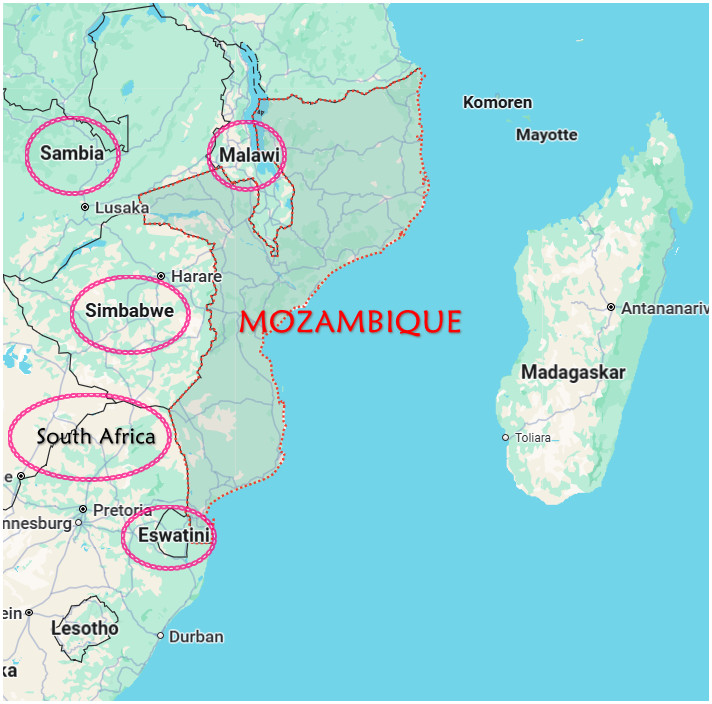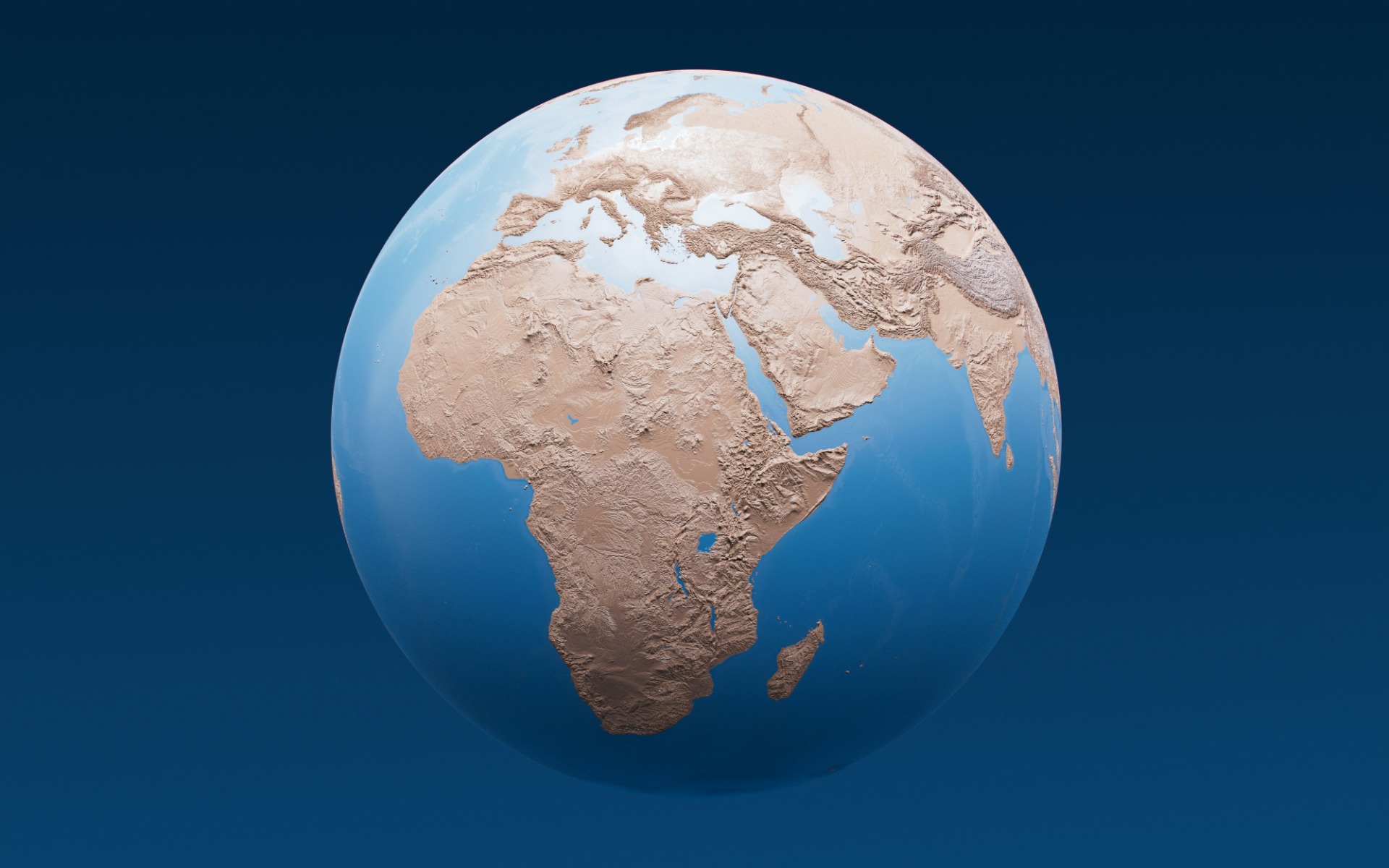Mozambique - location and regional connectivity
Mozambique: A Linchpin in Regional Connectivity
Mozambique, located on the southeastern coast of Africa, serves as a vital connector for its neighboring countries, making it a linchpin in regional connectivity. With its network of ports, roads, and railways, Mozambique plays a crucial role in facilitating the movement of goods and people across the Southern African region. Neighboring countries such as Zimbabwe, Malawi, Zambia, and Eswatini rely heavily on Mozambique's infrastructure for access to global markets, enhancing trade opportunities and fostering economic growth.

Geographic Significance
Mozambique's strategic location along the Indian Ocean provides a natural gateway for landlocked countries seeking access to international shipping routes. The country has a coastline of approximately 2,470 kilometers, which is dotted with several deep-water ports. Among the most important are the Port of Maputo, Port of Beira, and Port of Nacala. Each port is uniquely positioned to cater to different markets and export needs, ensuring efficient trade routes for neighboring nations.
The Maputo Corridor, which connects the Port of Maputo to South Africa's industrial heartland, is particularly vital. It facilitates substantial exports and imports between South Africa and its trade partners in the region. The corridor is not only a crucial route for Mozambique but also serves as the shortest path for heavy freight moving from South Africa to the Indian Ocean, making it indispensable for the mining and agricultural sectors.
Infrastructure Development
Mozambique's infrastructure has seen significant investments aimed at improving road, rail, and port facilities, enhancing its capacity to serve as a trade hub. The national road network, totaling approximately 30,562 kilometers, provides critical links between major urban centers, agricultural regions, and neighboring countries. The EN1 highway, running from Maputo to Pemba, is the backbone of this network, allowing for efficient transportation of goods throughout the country.
Additionally, the railway network, though historically challenged, has been revitalized to support cargo movement. The Nacala Railway, which connects the Port of Nacala with Tete Province, is a prime example of modernization efforts supported by significant investments from international partners such as Vale Moçambique and the World Bank. These upgrades enable the transport of coal and other products to international markets, thereby bolstering Mozambique's role as a regional connector.
Trade Relations with Neighboring Countries
Mozambique's ports and infrastructure are essential for the economies of its landlocked neighbors. Countries like Zimbabwe and Malawi rely on these routes for their imports and exports. For instance, the Beira Corridor connects the Port of Beira with Zimbabwe, facilitating the transport of agricultural products and commodities. This relationship not only supports Zimbabwe's economy but also creates reciprocal benefits for Mozambique through increased trade volumes.
Similarly, Malawi depends on Mozambique's infrastructure for access to the sea. The Nacala Corridor, which links the coastal port to cities in Malawi, allows for the efficient export of tea, tobacco, and other agricultural products. Recent agreements granting Malawi expanded access to Nacala Port have further cements Mozambique's role as a trade facilitator in the region. These connections enable landlocked countries to engage in international trade, enhancing their economic resilience and growth prospects.
Economic Impact of Regional Connectivity
Mozambique's infrastructure investments and its role as a trade gateway have a profound economic impact on the region. The connectivity provided by Mozambican ports reduces trade costs and transit times for neighboring countries, allowing them to access global markets more efficiently. By serving as a transit hub for imports and exports, Mozambique plays a crucial role in promoting regional economic integration and cooperation.
The economic benefits extend beyond traditional trade. Improved connectivity has created jobs, stimulated investments, and enhanced access to services for millions of people in the region. The transport sector alone accounts for about 10% of Mozambique's GDP, underscoring the significance of roads and railways in the national economy. As cargo volumes increase due to heightened connectivity, local economies experience growth through better market access and expanded employment opportunities.
Challenges and Future Prospects
Despite its strategic importance, Mozambique faces challenges that threaten its status as a regional linchpin. Climate vulnerability poses a significant risk, with cyclones and floods frequently damaging roads and other infrastructure. The destruction caused by Cyclone Idai in 2019 serves as a stark reminder of these risks, disrupting trade and damaging critical supply chains. Continued investment in climate-resilient infrastructure will be essential to safeguard Mozambique's role as a trade facilitator.
Additionally, regional security challenges, particularly in Cabo Delgado province due to ongoing insurgencies, have raised concerns about the stability of transportation routes. These security issues can deter investment and affect the movement of goods across borders, making it imperative for Mozambique to prioritize security and cooperation with its neighbors.
Looking ahead, Mozambique has the potential to enhance its position as a linchpin in regional connectivity further. With anticipated investments in infrastructure, such as the proposed North-South Railway, Mozambique can unify its transportation network and improve trade efficiency. Strengthening partnerships with neighboring countries and regional organizations, including the Southern African Development Community (SADC), will be crucial to addressing common challenges and maximizing the benefits of connectivity.
summary
In conclusion, Mozambique's strategic location, extensive road and railway network, and modernized ports make it an essential hub for regional connectivity in Southern Africa. By facilitating trade between neighboring countries and providing access to global markets, Mozambique is reinforcing its position as a vital trade gateway. While challenges remain, the ongoing investments in infrastructure and regional cooperation offer promising prospects for enhancing Mozambique's role as a linchpin in the economic growth of Southern Africa. As the country continues to navigate these complexities, its commitment to fostering connectivity and collaboration will be key to ensuring a more integrated and prosperous region.
